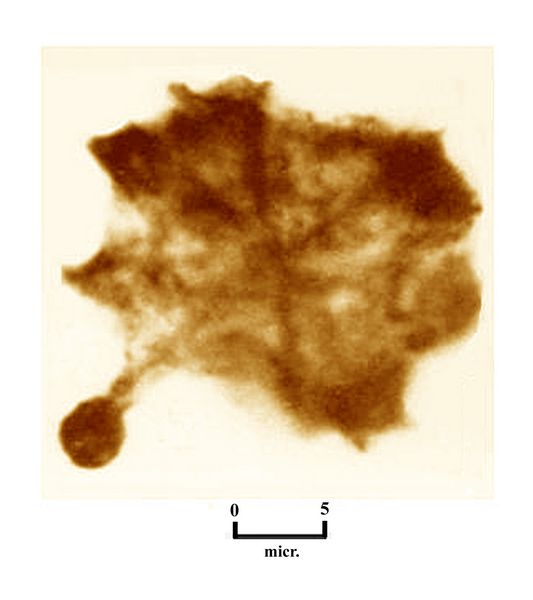Athena Review Image Archive ™
Kakabekia umbellata

Kakabekia umbellata (after Barghoorn and Tyler 1965)
Kakabekia umbellata
was a Precambrian prokaryote found in the Gunflint Chert Formation in
Ontario, Canada near Lake Superior. It is named for Kakabeka Falls, Ontario, and for its umbrella-like mantle. Dated at 2.1-1.9 billion years ago, it was one of
numerous microscopic fossil prokaryotes discovered in the early 1950s by Tyler and Baghoorn (1954, 1965) in the Gunflint
Chert. These were the first well-preserved fossils found of individual prokaryotes. Besides several taxa of
photosynthetic cyanobacteria, other forms preserved in the chert seemed completely new.
Kakabekia umbellata has a tripartite structure; with a globular or bulbous base, a main stem or stipe, and a parachute- or umbella-like crown with 7-8 secondary stipes or struts radiating out from the central stipes.
In 1964 a living species of Kakabekia named K. barghoorniana was found by S.M Siegel in soils from Wales, representing, in effect a living fossil of this genus. Like K. umbellata, K. barghoorniana is an anaerobic prokaryote which lacks a nucleus. It derives its energy from ammonia, with 6-8 sections in the mantle or umbrella which represents the mature stage. The main stipe or stem is 12- 30 microns long, while the umbrella-shaped mantle, which plays a role in spore distribution and reproduction, has a diameter of 5- 30 microns.
References
Barghoorn, E.S. and S.A. Tyler 1965. Microorganisms from the Gunflint chert. Science 147, pp. 563-577.
Siegal,
B.Z. and S.M. Siegal 1970. Biology of the Precambrian genus
Kakabekia: New Observations on Living Kakabekia barghoorniana. Proceedings of the National Academy of Sciences of the USA 67(2), pp. 1005-1010.
Siegal, S.M., K. Roberts, H. Nathan, and O. Daly 1967. Living Relative of the Microfossil Kakabekia. Science 156, pp. 1231-1234.
Tyler, S.A. and E.S. Barghoorn 1954. Occurrence of structurally preserved plants in Precambrian rocks of the Canadian Shield. Science 119, pp. 606-608.
Copyright © 1996-2020 Rust Family Foundation (All Rights Reserved).